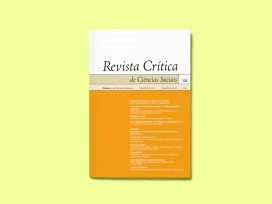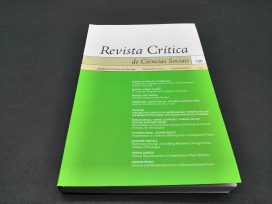Abstracts Revista Crítica 75 (2006)
Françoise Meltzer
On the question of Aufhebung: Baudelaire, Bataille, and Sartre
This essay looks at Sartre’s rather nasty 1943 essay on Bataille, “Un nouveau mystique”, and the further argument between the two writers about Baudelaire. Sartre accuses Bataille, in the latter’s Inner Experience, of introducing the “transcendent into the immanent”; of externalizing the ego such that human responsibility is elided; of leading, with its fascination with ritual, sacrifice, and community, to totalitarianism; of swallowing up history. Sartre uses Hegel’s concept of Aufhebung from the Phenomenology as the focus of his critique: Bataille, Sartre argues, removes synthesis from Hegel’s trinity of thesis/antithesis/ synthesis (Aufhebung) and puts tragedy in the place of the dialectic. This argument about the role of Aufhebung and the dialectic thus raises all the issues fundamental to what was to be called postmodernism: the role and sovereignty of subjectivity, the possibility of the sacred, the use of language, human freedom, the role of history in textual production, the individual as against the community, and the reasons for rejecting the possibility of a transcendental.
Joaquín Herrera Flores
Colonialism and violence. Foundations for a postcolonial reflection from a human rights perspective
The article discusses four fundamental mechanisms of Western colonialist diffusionism: the establishment of abusive generalizations that prevent the knowledge of the other’s complexity; the colonialist backlash and the concealment of the origins of colonialist processes; the transformation of geographical space; abstract humanism and its distance in relation to the depredatory practices of colonialism. The author analyzes these mechanisms from the perspective of a radical conception of human rights, and concludes that the capacity to fight for both cultural recognition and the just distribution of resources resides in the essential affirmation of these rights.
António Simões Lopes
Crossroads of development: Fallacies, dilemmas, heresies
This article starts by pointing to the misuse of the word development when one is thinking merely of growth, and then discusses the fallacies, dilemmas, and heresies associated with the concept and the (political) practice of development. The author contests the fact that the levels of development continue to be fundamentally measured by levels of income, and defends that, in all cases, given that growth prospects are quite weak, the model of development should be based more on sharing, that is, on wealth distribution, taking this as an objective that promotes the dignification of people – it’s unfair to continue to make the poor wait until we are all richer.
Fátima Antunes
Governance and the European educational space: The regulation of education and visions of the “Europa” project
The “indirect effects” of the dynamics of globalization on the field of education are visible both in the changes in the process of designing education policies and in the reconfiguration of the governance of education. Thus, concerning the Bologna Process, what seems to be on the agenda is the convergence with the model of market regulation through the creation of mechanisms and entities such as systems and agencies of quality guarantee and accreditation. Furthermore, the form of regulation determined by objectives constitutes a decisive development in processes of management of social and educational change in several sectors of education systems. The guiding project of constructing a European educational space and the lifelong learning paradigm seem to be part of the new legitimizing myths that derive from the desire to involve in one enveloping sweep the physical, social, and symbolic regulation of the territory and the creation of subjects.
Fernanda Maio
“Real lives, real people”: The representation of others in art in the public space
This article analyzes the public art event “Lisboa Capital do Nada” [Lisbon Capital of Nothing], which involved a series of projects of public intervention that took place in Lisbon in 2001. This project raises questions about the social role of art in the preservation of “authentic” ways of life, as well as about the role of the artist as witness of daily life in his/her attempt to regenerate urban spaces considered to be problematic and in helping to construct a social identity that identifies the people with the place. However, the mobility of artists, intellectuals, politicians, and experts contrasts with the stationary condition of others, who are thus subjected to a local identity and are objectified by a touristic gaze. This form of cultural tourism maintains the asymmetries of mobility, reinforcing the power of those that have control over their own mobility and over the circulation of meanings. In attempting to substitute the fragmented and subjective experience of space by a disciplining and unifying, or coherent, representation, the concept of place as process is disregarded.
Oscar José Rover & Maria Adosinda Henriques
Debating democratic management: The LEADER programme and its relation with local civil society
This article discusses the European Union LEADER programme for rural regions, analyzing whether, in the case of Portugal, local autonomy in the definition of strategies and projects has been positive for local territories or whether this has benefited only some actors in these territories by not putting enough stress on the guiding principles of this programme, through practices of inclusion of more needy and unorganized groups. This reflection on the LEADER programme can be extrapolated to other local contexts. In general terms, if on the one hand practices of participatory democracy can contribute to the development of local populations, particularly the most needy and unorganized, on the other hand it is also evident that the argument of democracy and development is often used to reproduce local practices of social domination and inequality.
Carlos Walter Porto Gonçalves
The geography of violence in the Brazilian countryside: What the 2003 data tell us
This article analyzes violence in the Brazilian countryside based on data collected by the Land Pastoral Commission (CPT) relating to violence against people and to social and power struggles. Based on the construction of a set of indicators of the incidence and the public and private forms of violence exerted on rural populations, the author focuses on the geography of violence and explores the similarities and differences that can be detected among the different regions and states of Brazil. The analysis allows us to see the extent to which current processes of agrarian development and socio-economic modernization of the countryside reproduce, or reinvent, social and power relations based on violence, which give continuance to renewed forms of modern coloniality.
Published 25 January 2007
Original in Portuguese
Contributed by Revista Crítica de Ciências Sociais © Revista Crítica de Ciências Sociais Eurozine
PDF/PRINTNewsletter
Subscribe to know what’s worth thinking about.



